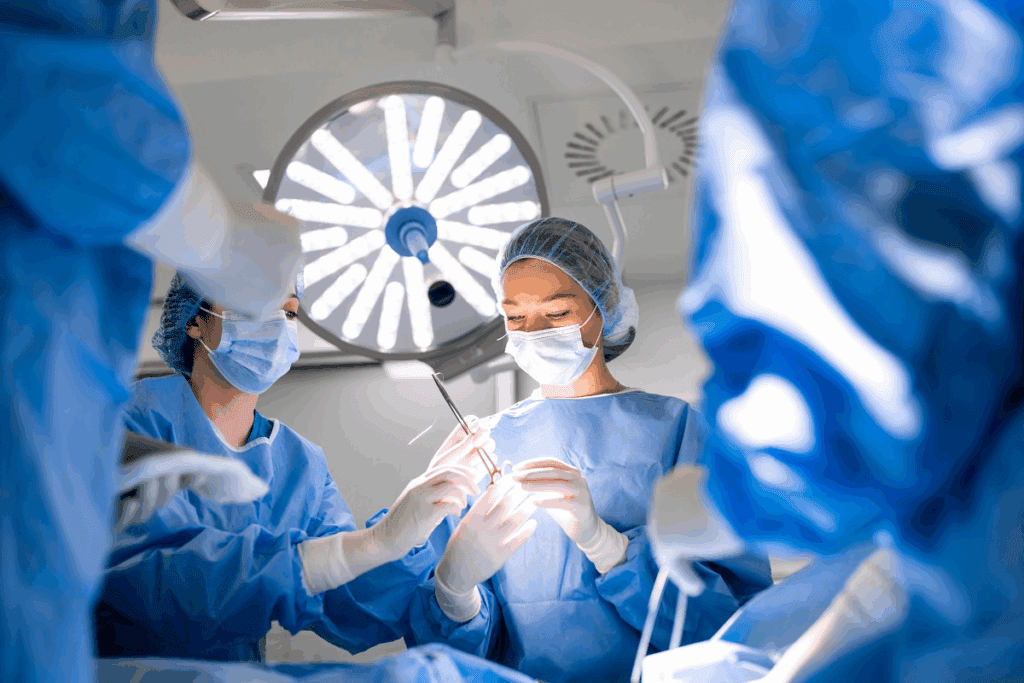Last Updated on November 27, 2025 by Bilal Hasdemir

Having prostate removal surgery is a big deal, both emotionally and physically. Medical News Today says hormone therapy for prostate cancer can cause mood swings or depression.Learn life expectancy after prostate removal whether an operate prostate procedure is truly worth it and what recovery looks like.
The surgery saves lives but can change a person’s life in many ways. It’s important for patients to know about the prostate surgery side effects before they start their journey.
Some people might feel different emotionally after the surgery. Knowing about these changes can help patients and their families deal with them better.

Prostate surgery includes many procedures to tackle prostate health issues, like prostate cancer. The main goal is to remove the prostate gland, either partially or fully. This depends on the diagnosis and how far the disease has spread.
Prostate surgery is a key treatment for prostate cancer. It can offer a cure or control the disease well. The surgery type chosen depends on the cancer’s stage, how aggressive it is, and the patient’s health.
There are several prostate surgery procedures, each with its own use and benefits. The most common ones are:
| Surgical Procedure | Description | Potential Benefits |
| Radical Prostatectomy | Complete removal of the prostate gland | Potential cure for localized prostate cancer |
| Nerve-Sparing Prostatectomy | Preserves nerves for erectile function | Reduced risk of erectile dysfunction |
| Laparoscopic Prostatectomy | Minimally invasive technique | Quicker recovery times |
| Robotic-Assisted Laparoscopic Prostatectomy | Utilizes robotic technology for enhanced precision | Improved surgical outcomes |
Prostate removal, or prostatectomy, is needed when prostate cancer is found, mainly if it’s in its early stages and can be cured. The choice to have prostate removal surgery depends on several factors. These include the cancer’s stage and grade, the patient’s age, health, and personal wishes.
Knowing why prostate removal is needed and the different surgery options can help patients make better choices. It’s key for patients to talk about their situation and the surgery’s benefits and risks with their doctor.

Patients often wonder what to expect after prostate surgery. The recovery time can vary a lot. It depends on health, age, and the surgery type.
The first days after surgery are key. You’ll manage pain, deal with catheter issues, and watch for complications. Most spend a few days to a week at home before getting back to normal.
Pain management is very important. Doctors give pain meds to help. Always follow their advice on how much to take and report any bad pain.
Healing after prostate surgery can take months. Side effects like urinary incontinence might go away in 2-3 months. But erectile dysfunction could take up to a year or more to get better. Knowing it takes time can help you stay patient and focused on healing.
To help your recovery, eat well and stay active. Your doctor will tell you what’s best. Also, keep up with doctor visits to check on your progress and talk about any issues.
Knowing what to expect can make the journey after prostate removal easier. It helps you work towards getting your strength and life back.
Prostate surgery can change a man’s life a lot. It can cause physical side effects that change how they feel. These changes can make men feel sad and affect their happiness and life quality.
Urinary incontinence is a common side effect of prostate surgery. It makes men leak or lose control of their bladder. This can make them feel embarrassed, anxious, and depressed. It can also change how they act and interact with others.
The emotional impact of urinary incontinence is big. Men might feel less confident and less proud of themselves. This can change their personality and how they feel about themselves.
Erectile dysfunction (ED) is another common side effect of prostate surgery. It makes it hard for men to get or keep an erection. ED can really affect a man’s feeling of being a man and how he sees himself. It can make him feel not good enough and low in self-esteem.
Managing pain well after prostate surgery is very important. Uncontrolled pain can make people feel irritable and depressed. The link between pain and mood is complex. Good pain management can really help someone feel better.
Men should talk to their doctor about pain management. This can help avoid mood changes and make recovery easier.
Patients who have prostate surgery might see hormonal shifts. These changes can affect their health a lot. Hormone therapy for prostate cancer, used with surgery, can cause big hormonal changes.
Hormonal imbalances after surgery can show up in mood swings, depression, and anxiety. Medical News Today says hormone therapy can cause these symptoms. This is because hormone levels change.
It’s important to manage hormonal imbalances after prostate removal. This helps keep you feeling well. Here are some ways to do it:
Knowing about hormonal changes after prostate removal and using the right management strategies can help. This way, patients can deal with the challenges these changes bring.
Getting a prostate cancer diagnosis can change your life. It affects not just your health but also your emotions and mind.
The time before surgery is hard for patients. They must face their diagnosis and the surgery ahead.
Many prostate cancer patients feel anxious before surgery. They worry about the surgery’s success, possible side effects, and their future. This anxiety can make it hard to sleep, focus, and do everyday things. Studies show that men with high anxiety scores may feel more stressed after surgery.
It’s important to manage anxiety before surgery. Things like counseling, relaxation methods, and support groups can help. They make patients feel better and more ready for what’s ahead.
Dealing with a cancer diagnosis is hard and never really ends. Patients must accept their diagnosis, the treatment, and how it might change their life. This can be very emotionally challenging and requires a big adjustment.
Recovering from prostate surgery is tough. Patients face physical and emotional challenges. Having support from loved ones and healthcare is key. It helps them deal with their diagnosis and the changes they’re going through.
Many wonder how prostate removal surgery affects their life span. Knowing the statistics and what affects life expectancy can help. It gives insights for those facing this tough situation.
Studies show most people with early-stage prostate cancer live a long time after surgery. This is good news for those with the disease. It shows how well modern treatments work.
Survival rates are key to measuring treatment success. For early-stage prostate cancer, the 5-year survival rate is almost 100%. This highlights the need for early detection and treatment.
Several things can affect life expectancy after surgery. These include age, health, and cancer stage at diagnosis. For example, older patients or those with health issues face different challenges.
The psychological effect of knowing one’s survival rate is huge. Good survival stats can give hope and reduce worry. But, knowing what affects survival can help prepare for the future.
Healthcare providers should offer emotional support and resources. This helps patients deal with the emotional side of their diagnosis and treatment. It aids in their recovery journey.
Prostate surgery affects more than just the body. It can change how men feel emotionally. They may face a mix of emotions as they recover and adjust.
Many men feel depressed and anxious after prostate surgery. These feelings can come from the surgery, hormone changes, or the shock of a cancer diagnosis. It’s key to spot the signs of depression and anxiety, like feeling sad all the time, losing interest in things, and worrying too much.
Men with a high neuroticism score might feel these changes more. It’s important to watch mental health and get help when needed.
Prostate surgery can also affect how men see themselves and their confidence. They might feel less masculine if they have erectile dysfunction or urinary incontinence. Building confidence and self-esteem takes time and support.
Surviving prostate cancer and surgery can change what men value and how they see life. They might rethink their values, relationships, and goals. This time can be a chance for personal growth and renewal.
Understanding these emotional and personality changes helps men and their loved ones deal with prostate surgery and recovery.
Prostate surgery affects more than just physical health. It changes relationships and how we interact with others. Removing the prostate gland is a big step that impacts a man’s personal and social life.
Sexual relationships often change after prostate surgery. Erectile dysfunction is a common issue. It can hurt a man’s self-esteem and intimacy with their partner.
Studies show erectile dysfunction can make sex less satisfying. It can also put a strain on relationships. Men and their partners must adapt to these changes.
Open communication and seeking help are key. Counseling or therapy can help navigate these changes.
Good communication is vital in any relationship, more so after prostate surgery. Men might find it hard to talk about their feelings or sexual changes. Communication challenges can stem from embarrassment, shame, or fear of being a burden.
It’s important for couples to keep talking openly. Couples therapy can help address these issues and strengthen their bond.
Research shows prostate cancer and its treatment can increase divorce rates. The stress and changes from surgery can strain relationships. Yet, many couples grow closer as they face these challenges together.
Support from family, friends, and support groups is key. Acknowledging challenges and seeking help can help couples maintain a strong relationship.
The journey after prostate surgery is not just about getting better physically. It’s also about getting used to the emotional and psychological changes. People often look for ways to deal with these challenges.
Survivors of prostate cancer can greatly benefit from good mental health strategies. Medical News Today says counseling and support groups are key. They help people cope with what comes after surgery. Family and friends also play a big role in supporting them during recovery.
Mental health strategies that are often recommended include:
Adjusting to life after prostate surgery is tough. It means getting used to changes in how you feel and function. Using effective coping strategies can help a lot.
It’s important for survivors to be kind to themselves during this time. By being patient and compassionate, they can find their way back to emotional and psychological balance. This improves their overall quality of life.
Recovering from prostate surgery is not just about the body. It’s also about the mind. Having a strong support network is key. It helps stabilize your personality during this time.
Family and friends are the first to support those recovering from prostate surgery. They offer emotional support, help with daily tasks, and encourage following doctor’s orders. Support from loved ones can reduce feelings of loneliness and anxiety that come with surgery.
A study in the Journal of Clinical Oncology found that strong social support leads to better recovery. “Patients with supportive families and friends have lower stress and anxiety,” the study says.
There are also professional support options for emotional and psychological recovery. Professional counselors or therapists can help manage anxiety, depression, and other emotional challenges after surgery.
These services include individual, couples, or family therapy. They help with issues like erectile dysfunction, urinary incontinence, and changes in self-image.
Support groups and peer connections are also valuable. They let you share experiences, get advice, and connect with others facing similar challenges. Being part of a community that understands prostate cancer and surgery can be very empowering.
“The camaraderie and shared understanding within support groups can be a powerful tool in the healing process, providing emotional support and practical advice.”
Groups like the Prostate Cancer Foundation and the American Cancer Society offer support. They help navigate the emotional and psychological aspects of recovery.
Many people who have prostate surgery notice big changes in their personality. The journey through prostate cancer and surgery is tough. But it also opens doors for personal growth and change.
Men often say they appreciate life more after surgery. Facing a serious health issue makes them think about what’s important. They start to see life in a new light.
Going through surgery and recovery builds resilience and personal strength. Men feel more ready to face life’s challenges. They learn to handle tough situations.
Prostate surgery makes people rethink their values and relationships. They start to focus on what truly matters. This includes family, health, and personal happiness.
These changes can greatly improve someone’s life and well-being. They show how complex and impactful prostate surgery can be.
Prostate surgery starts a new chapter in a man’s life. Making lifestyle changes is key to emotional healing. Healthy habits can greatly improve emotional well-being during recovery.
Eating well is essential for recovery and emotional health. Eat more fruits, vegetables, and whole grains for important nutrients and antioxidants. Avoid processed foods, sugars, and fats that can harm mood and energy.
Here are some diet tips:
Regular exercise is key for emotional well-being after surgery. Exercise can lower anxiety and depression symptoms, improve sleep, and boost health.
| Exercise Type | Benefits |
| Aerobic Exercises (e.g., walking, cycling) | Improves heart health, reduces tiredness |
| Strength Training | Builds muscle, increases metabolism |
| Flexibility and Stretching Exercises | Increases flexibility, lowers muscle tension |
Managing stress is critical for emotional health after surgery. Meditation, deep breathing, and mindfulness can reduce stress and help relax. Doing things that bring joy and fulfillment is also helpful.
More stress management tips include:
By making these lifestyle changes, men can support their emotional well-being after prostate surgery. This leads to a healthier and more fulfilling recovery.
The time after prostate surgery is very important. Big changes in personality might mean you need help from a professional. Many men get better and adjust well after surgery. But some changes can really affect their daily life and relationships.
It’s key to know when you need professional help. Look out for these signs:
If you or someone you know is showing these signs, getting help from a mental health expert is vital.
Cancer survivors, including those who’ve had prostate surgery, can get many mental health treatments. These include:
By getting professional help, people can deal with the tough times after prostate surgery. This can really help improve their overall health and happiness.
Life after prostate surgery can be tough, but many people find joy and fulfillment. It’s important to understand the changes that come with surgery for a smooth recovery.
Adapting to physical and emotional changes is key after surgery. Recovery takes time, patience, and care for yourself. Recognizing the changes and getting help when needed helps you move forward.
Having support from loved ones and healthcare teams is essential. Using these resources and focusing on self-care helps you deal with recovery’s challenges. This way, you can find a new sense of normalcy.
Side effects include urinary incontinence and erectile dysfunction. Changes in sexual function are also common. Some men may feel depressed or anxious.
Yes, surgery can lead to emotional and personality changes. Men may appreciate life more, become more resilient, and change their values and relationships.
Recovery time varies, but most men take weeks to months to fully recover. The first few weeks are usually the toughest.
Removing the prostate gland can affect testosterone levels. This can change mood and behavior.
A cancer diagnosis can cause a lot of anxiety and stress. This stress can last even after surgery. Dealing with the diagnosis and recovery is challenging.
Life expectancy depends on cancer stage, health, and other factors. Many men live for years after surgery, thanks to advances in treatment.
Surgery can change sexual relationships and communication. Some men may have less libido or erectile dysfunction.
Counseling, support groups, and stress management can help. These strategies support emotional and psychological recovery.
Family, friends, and support groups are key. They help stabilize personality and aid in recovery.
Eating right, exercising, and managing stress can help. These habits support emotional health and overall well-being.
If you’re feeling persistently or severely depressed or anxious, seek help. A mental health expert can provide support.
Yes, the prostate gland can be removed. This can lead to changes in urinary and sexual function, as well as emotional and psychological changes.
Some men may have permanent side effects like urinary incontinence or erectile dysfunction. The severity and duration vary.
Surgery can impact quality of life, but many men adapt well. Some even report positive changes in their outlook and priorities.
Subscribe to our e-newsletter to stay informed about the latest innovations in the world of health and exclusive offers!